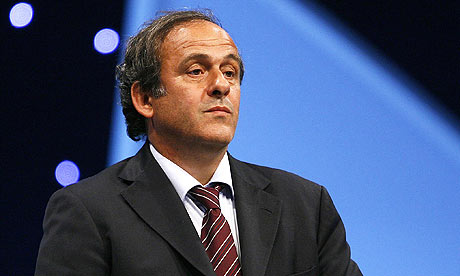Uefa investigates 40 European games in match-fixing crackdown
• Eastern European teams are the focus of Uefa investigation
• No English or major European names thought to be involved
- guardian.co.uk, Friday 25 September 2009 21.36 BST
- Article history
Forty Champions League and Uefa Cup games are under investigation for suspected match-fixing, European football's governing body revealed today.
All of the cases, 15 of which took place in the last two years and the rest within the last four to five years, concerned early qualifying rounds and most involved clubs from eastern Europe. Although Uefa said it would not make public the identity of the clubs under suspicion unless it amassed enough evidence to charge them, it is not believed that any English clubs or big European names are involved.

Michel Platini has promised a crackdown on match-fixing. Photograph: Peter Byrne/PA Wire/PA Photos
Peter Limacher, the head of disciplinary services at Uefa, said: "Right now it's mainly eastern Europe clubs being investigated. They know they are not going to be involved later in the tournament and they are going out, so decide, 'Let's make a profit.'
"In the cases we have seen it's really the deliberate planned fix of the games, the whole games. First the result at half-time, then after 90 minutes. It might take some time [to convict] but, in cases where we can work together with the police, that might be possible."
In each case, Uefa was alerted when bookmakers reported suspicious betting patterns. William Gaillard, senior advisor to Uefa's president, Michel Platini, said that most cases involved clubs where players did not earn much and so were tempted to fix results.
In March Uefa announced a wide-ranging crackdown on corruption. It promised to work with national associations to fund a monitoring programme across 29,000 fixtures in the top two divisions of all 53 member countries as well as its own competitions.
Platini has made the fight against corruption a key priority of his presidency, telling Uefa's inaugural betting and integrity workshop in August that fixing matches "takes away their raison d'être, deprives them of the magic of competition and is ultimately killing football".
Its new Betting Fraud Detection System, a sophisticated piece of monitoring software operated by a team of anti-corruption officers, has been in operation since the beginning of the season.
As happened in cricket in the wake of high-profile match-fixing scandals in the 1990s, Uefa also resolved to improve education programmes in order to advise young players on what to do if they were approached by fixers or middlemen.
The issue is high on the agenda of all sports administrators, with the rapid explosion in online gambling, the rise of powerful betting syndicates in the Far East and the vast range of bets now on offer all heightening the risk.
Snooker, cricket and tennis have all faced high profile allegations of match fixing in recent years, causing some governing bodies to lobby for bookmakers to fund new anti-corruption units to help police their sports on a global level.
Uefa announced last month that three Macedonian clubs were being investigated after banning the former champion FK Pobeda from European competitions for eight years.

No comments:
Post a Comment